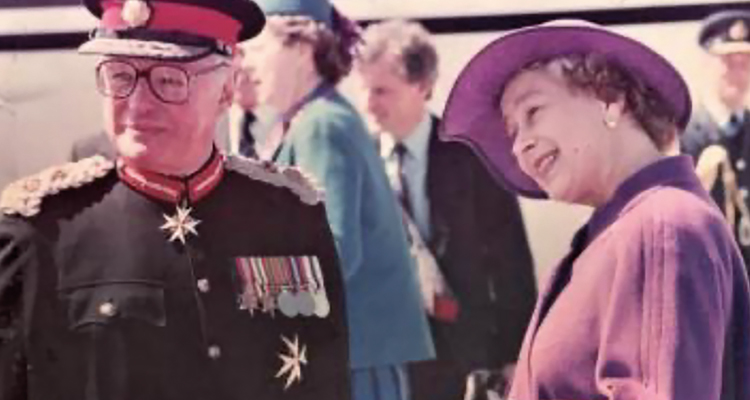14 December 1921 – 11 November 2022
A cultured man of wide interests who, having begun his career as an eminent musicologist, enjoyed an active and varied life, he went on to revive the historic Towneley name.
In the process, embracing all manner of causes large and small, he made a distinctive and distinguished contribution to British life. Subsequently appointed the sovereign’s longstanding representative in the County Palatine, his notable cultural legacies there include the creation of the Northern Ballet Theatre in 1969. His expertise as founding chairman proved pivotal in overseeing its growth from humble beginnings to becoming the national and international leader in dance and live theatre that it is today.
About the same time, when the future of Manchester’s Northern School of Music was threatened by a road-widening scheme, Towneley played a key role in steering through its amalgamation with its near neighbour, the Royal Manchester College of Music, to create what ultimately became the Royal Northern College of Music, the first new conservatoire to be built in Britain in the 20th century.
Simon Peter Edmund Cosmo William Koch de Gooreynd was born in 1921 at his parents’ house in Belgrave Square. Because the pianist Ignacy Jan Paderewski was giving a recital there at the time his mother, Priscilla Reyntiens, the granddaughter of the Earl of Abingdon, was asked to “give birth as quietly as possible”. His Belgian-born father Alexander “Lexie” Koch de Gooreynd had been educated at Eton before becoming a colonel in the Irish Guards.
When standing as a parliamentary candidate, Simon’s father found his name a handicap and adopted the name of Worsthorne, taken from a Lancashire village that was part of the family estate. It was the name his younger brother, Sir Peregrine, kept throughout his distinguished journalistic career, most notably as the editor of The Sunday Telegraph. Both boys were brought up by their mother, who subsequently went on to marry Montagu Norman, a governor of the Bank of England.
Towneley was educated at Stowe before winning a scholarship to study at Worcester College, Oxford. The war intervened and after seeing action with the King’s Royal Rifles in Italy, he was captured and served for a time as a prisoner of war. On the cessation of hostilities, he returned to Oxford to complete his education before staying at the university to lecture in music and complete his doctoral dissertation. In 1954, under the name of Simon Towneley Worsthorne, he published what has long remained a seminal text, Venetian Opera in the Seventeenth Century.
Upon marrying his second cousin Mary Fitzherbert in 1955, he changed his surname to Towneley, courtesy of a royal licence. Their histories were not only linked because the grandmothers of the bride and bridegroom were sisters but also because, in 1589, both John Towneley and Sir Thomas Fitzherbert had been cruelly persecuted for their Catholic faith. Settling at Dyneley Hall, the family seat in Lancashire, the couple built the smallest oratory in Britain. Mass would be said in it every Sunday by a Jesuit priest wearing the pre-Reformation vestments bequeathed by the Abbot of Whalley at the Dissolution of the Monasteries.
Towneley became a justice of the peace in 1956 and lord lieutenant and custos rotulorum of Lancashire in 1976. While in office for 20 years, he was also, among many other roles, a member of the Council of the Duchy of Lancaster, a director of Granada Television and a trustee of both the Historic Churches Preservation Trust and the British Museum.
Over the years Dyneley Hall would play host to numerous classical music concerts. As well as being a cello player, Towneley was also a keen gardener and a longstanding member of the International Dendrology Society. Having restored the gardens at Dyneley, he enjoyed swapping rare seeds with fellow enthusiasts worldwide. He was appointed KCVO in 1994.
He was also a keen supporter of his wife’s many equestrian activities, notably the opening up of the Mary Towneley Loop, the first multi-user national trail. She died in 2001. The couple had one son and six daughters. Peregrine is chairman of the BMS Group. Of the daughters, the third, Katharine, is now better known as the successful writer Katie Grant, and it is to his fifth daughter, Cosima, that the mantle of community service has now passed. A long-serving local councillor, she is the mayor of Burnley.
According to the eulogy his son gave at his funeral, Sir Simon died “fortified by the rites of the Holy Church and a partridge and a bottle of champagne”.
Obituary from The Times

